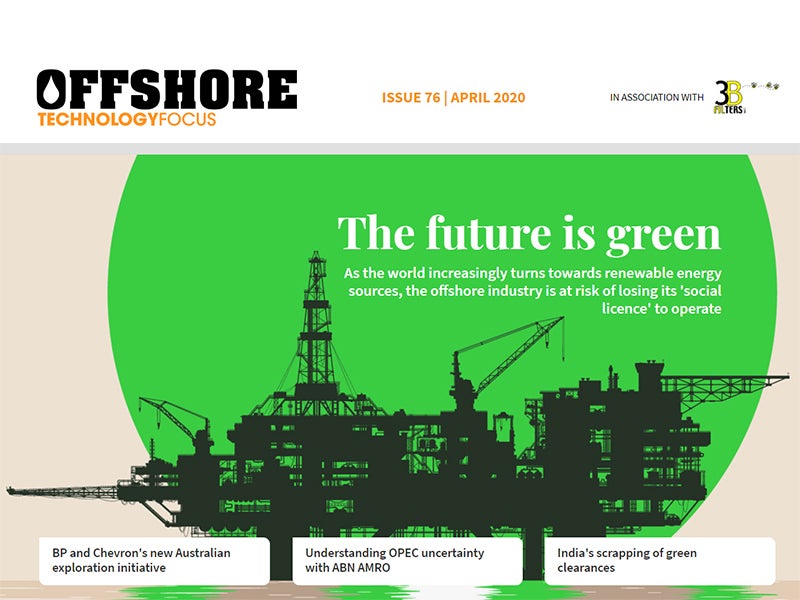
The chairman of the UK’s Oil and Gas Authority has warned that the industry may lose its “social licence to operate” if it cannot show itself to be part of the solution to the climate crisis. We investigate the threat to the industry.
BP and Chevron have partnered to fund new exploration initiatives in Australia. We look into where the funding will be going and what it means for the Australian offshore sector.And with production beginning at Johan Sverdrup, we ask if the best is good enough when it comes to greening offshore discoveries.
Elsewhere, we speak to senior economist Hans van Cleef about ABN AMRO’s predictions of uncertain performance from OPEC in the coming year. We also find out how offshore firms can be part of the eco-solution. Finally, we examine asset life extensions, what goes into pitching decommissioning services, and India’s scrapping of green clearances for the offshore sector.
Click here to read the latest mining industry news and analysis, and join the conversation on Twitter.
In this issue
Losing the social licence: what should the UK oil and gas industry do next?
Pressure is increasing on the oil and gas industry to define its role in the energy transition away from fossil fuels or risk losing its social licence to operate. Heidi Vella spoke to the Energy Institute’s external affairs director Nick Turton to find out what the sector should do next.
Is it the right time for oil exploration in Australia?
While the Australian Government is determined to extract fossil fuels in their quest to grow the economy, Australia’s people – angered by inaction after waves of devastating bushfires – are beginning to demand a more decisive response to climate change. Given this, Scarlett Evans, asks, is it the right time for new exploration in Australia?
Electric dreams: powering Equinor’s Johan Sverdrup oil field
Equinor’s vast Johan Sverdrup oil field uses a shore-based renewable power supply to significantly cut production-related CO2 emissions, but when the oil sold is still burned around the world, how great are the long-term savings? Julian Turner looks at one of the world’s most sustainable plays.
Understanding OPEC uncertainty with ABN AMRO
In December, Dutch bank ABN AMRO released its assessment of the oil and gas sector in 2019, highlighting OPEC’s unconvincing performance and predicting lower prices in the coming year. JP Casey speaks to senior economist Hans van Cleef about the bank’s predictions, and how this could define the offshore sector.
Five ways the oil and gas industry can mitigate climate catastrophe
With their vast knowledge and deep pockets, can oil and gas companies play a central role in avoiding climate catastrophe? Some argue that the very scale of climate change will take a specific set of strategies for a safe and smooth transition. From addressing scope 3 emissions to carbon capture storage, Yoana Cholteeva looks at five ways the offshore industry can take a lead.
Making the right offer: environmental and economic concerns in decommissioning
Decommissioning is more important to the offshore sector than ever, creating new projects for technology firms eager to get involved in the practice. JP Casey speaks to Aquaterra energy about these opportunities, and the challenges that spring up around them.
Deepwater exploration: what it takes to drill really really deep
With the news that Total SA is set to drill the world’s deepest offshore well in Angola, Yoana Cholteeva takes a look at the significance of this operation to the country’s economy and the challenges oil operators should be prepared for when drilling this deep.
Hello hydrocarbons: energy security and environmental risks in India
As India looks to deliver long-term energy security, the government has announced a reclassification of hydrocarbon exploration laws that will see offshore oil and gas projects exempt from social challenges and environmental restrictions. JP Casey explores how, while this could help secure India’s energy future, it could come at a great social and environmental cost.
Where foresight replaces hindsight: how AI impacts the future of oil and gas safety
Artificial intelligence promises to be transformative across industries, and in the offshore sector it could produce a safety revolution. Heather Stewart, director of operations at Advisian Digital, and Chris Aitken, co-founder and CEO of SaltGrid, explain more.
Preview – Offshore Technology Focus June 2020
In February, the International Energy Agency said that global oil demand would drop this quarter for the first time in over a decade as fears over coronavirus batter the global economy. Significant too is the fact that OPEC production cuts have done little to reduce surplus. We look at the factors behind the drop in oil demand.
Also, we look into the history of the dispute in the Saudi-Kuwait Neutral Zone and what it could mean for offshore producers in the region.And following BP’s announcement of its plan for net zero, we examine how the company is forging a path for corporate responsibility in the sector.
Elsewhere, we get the inside line on Aker BP and Cognite’s trial of robotic systems that could improve offshore efficiency, safety and sustainability.We also find out how Equinor plans to extend the life of the Statfjord field for another two decades.
Finally, we examine Russia’s $300bn Arctic offshore project, the effect of Orsted’s transition to renewables, and what the shutdown of the Forties pipeline means for the industry.



